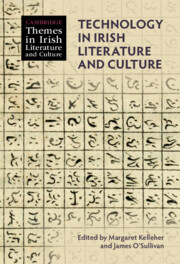Book contents
- Technology in Irish Literature and Culture
- Cambridge Themes in Irish Literature and Culture
- Technology in Irish Literature and Culture
- Copyright page
- Epigraph
- Contents
- Contributors
- Cambridge Themes in Irish Literature and Culture
- Acknowledgements
- Introduction
- Part I Genealogies
- Chapter 1 Print as Technology: The Case of the Irish Language, 1571–1850
- Chapter 2 Printing and Publishing Technologies, 1700–1820
- Chapter 3 The Optical Telegraph, the United Irish Press, and Maria Edgeworth’s ‘White Pigeon’
- Chapter 4 Technologies of Sound: Telephone/Gramophone
- Part II Infrastructures
- Part III Invention
- Part IV The Digital
- Index
- References
Chapter 2 - Printing and Publishing Technologies, 1700–1820
from Part I - Genealogies
Published online by Cambridge University Press: 19 January 2023
- Technology in Irish Literature and Culture
- Cambridge Themes in Irish Literature and Culture
- Technology in Irish Literature and Culture
- Copyright page
- Epigraph
- Contents
- Contributors
- Cambridge Themes in Irish Literature and Culture
- Acknowledgements
- Introduction
- Part I Genealogies
- Chapter 1 Print as Technology: The Case of the Irish Language, 1571–1850
- Chapter 2 Printing and Publishing Technologies, 1700–1820
- Chapter 3 The Optical Telegraph, the United Irish Press, and Maria Edgeworth’s ‘White Pigeon’
- Chapter 4 Technologies of Sound: Telephone/Gramophone
- Part II Infrastructures
- Part III Invention
- Part IV The Digital
- Index
- References
Summary
This chapter looks at the period 1700 to 1820, one of profound change in Ireland as technological advances coupled with social and educational developments deeply influenced the intellectual and literary landscape. In the six and a half centuries since the invention of printing many new technologies affected the creation, distribution, consumption, and enjoyment of printed texts. Innovations and developments in printing, typefounding, papermaking, and marketing contributed to the advance of literary culture. The rise in education from the eighteenth century created an audience for literature in its many forms. Imaginative writing developed and attracted new audiences as literacy expanded among different cohorts. The newspaper provided the most comprehensive medium for the dissemination of information. Literacy was not necessarily a requirement as evidence shows that one newspaper could be shared among readers and read aloud to groups of listeners. Print advertising, an eighteenth-century innovation, increased the market for literary works.
Keywords
- Type
- Chapter
- Information
- Technology in Irish Literature and Culture , pp. 29 - 48Publisher: Cambridge University PressPrint publication year: 2023



